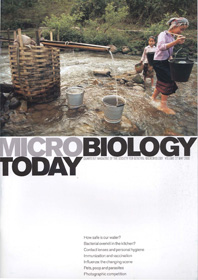Microbes in the home
01 May 2000 publication
The lead articles of the May 2000 issue of Microbiology Today are on the safety of our water; bacterial overkill in the kitchen; contact lenses and personal hygiene; immunisation and vaccination; influenza; and pets, poop and parasites.
Immersed in a microbial sea (p. 62)
Should we eat a 'peck of muck' to boost our immune system? Hugh Pennington thinks not in an overview of the risks posed by microbes in our domestic environment.
Is there a risk of bacterial overkill in the kitchen? (p. 64)
Poor kitchen hygiene can lead to foodborne infections. But do the new antimicrobial products provide the right remedy? And can we ever eliminate human error in the home? Charles Penn and Anthony Hilton try to answer these questions.
Through a glass darkly - Contact lenses and personal hygiene (p. 66)
Contact lenses are a popular alternative to specatables, but poor hygiene in their use can lead to serious eye infections, as Simon Kilvington explains.
Immunisation against the classic infectious diseases of childhood (p. 70)
Immunisation has caused massive reductions in childhood sickness and mortality over the psat 50 years. Liz Miller explores current practice and describes the impact of the anti-vaccine lobby.
Obituary (p. 73)
Robert Poole writes about the highlights and achievements of John Pirt's life.
Problems in the development of new vaccines (p. 74)
The scientific difficulties of vaccine development must not be underestimated, but as Philip Minor discusses, the socio-economic and ethical issues also pose many problems.
Influenza: the changing scene (p. 76)
Influenza is an unpleasant illness which can lead to death, mainly in the elderly. Douglas Fleming describes the current incidence of flu, some new methods of diagnosis and recent advances in treatment.
Water, water everywhere - But is it safe to drink? (p. 78)
Most of us expect clean water to be on tap, but in many parts of the world there is no piped water. Even in developed counries constant vigilance is necessary if water is not to be a hazard to health, explains Peter Wyn-Jones.
Pets, poop and parasites (p. 84)
There are millions of domestic pets in the world. But what threats to human health do they pose, and what can we do to minimise the risks? G. Suresh Kumar and Huw Smith explore this topic.
Going Public (p. 96)
Many companies promote science to the public, as well as their products. Ian Davidson describes the educational activities of Unipath for 16+ students.
Comment (p. 112)
Sally Bloomfield discusses hygiene in the home.

